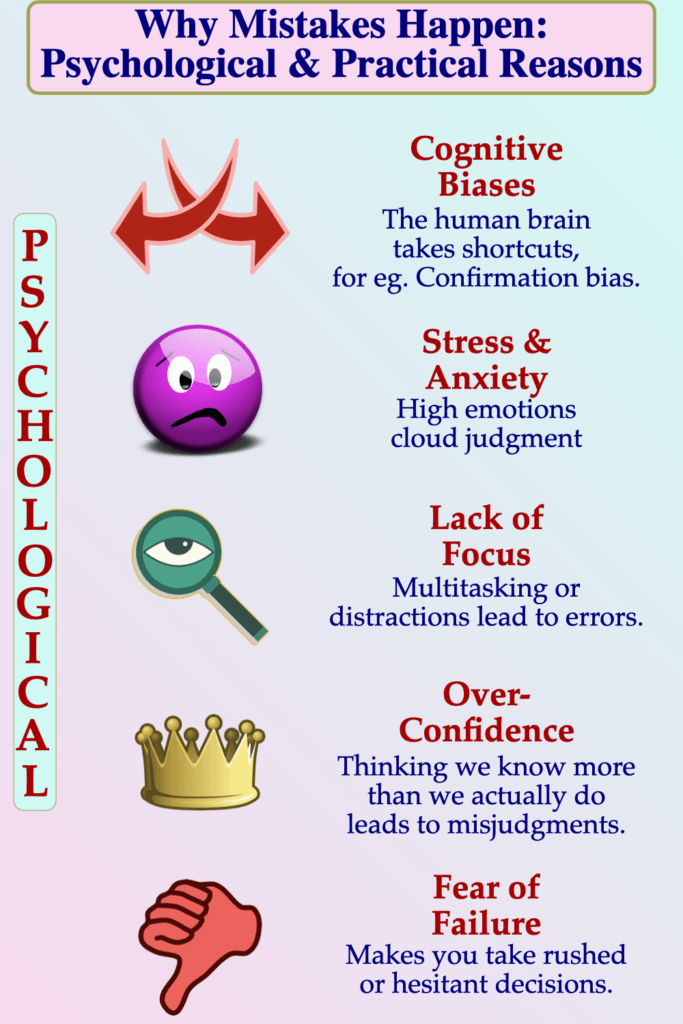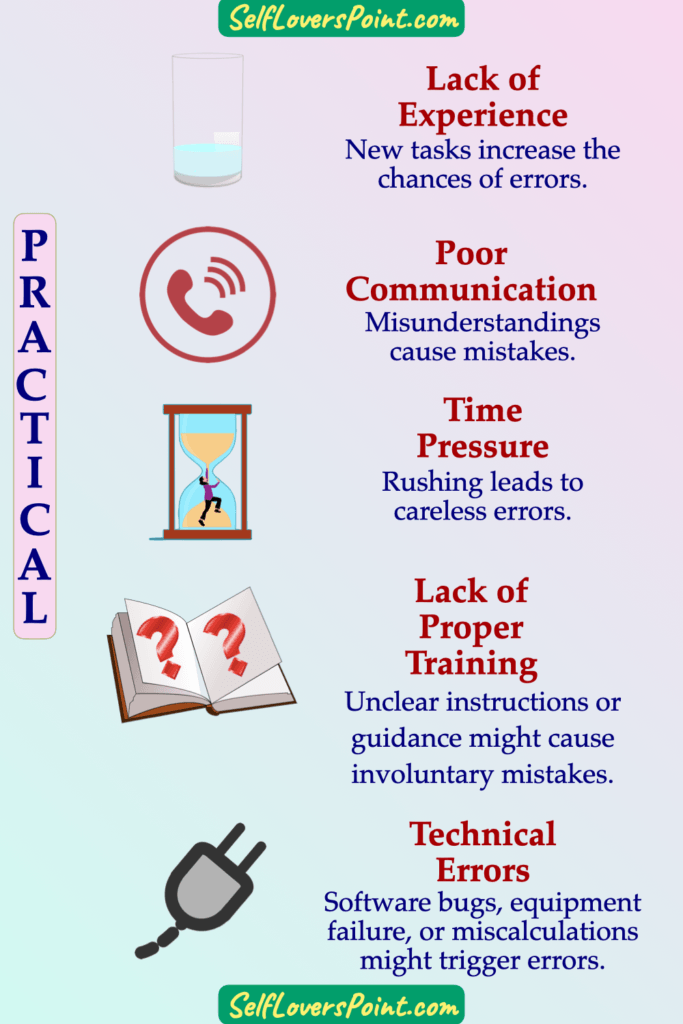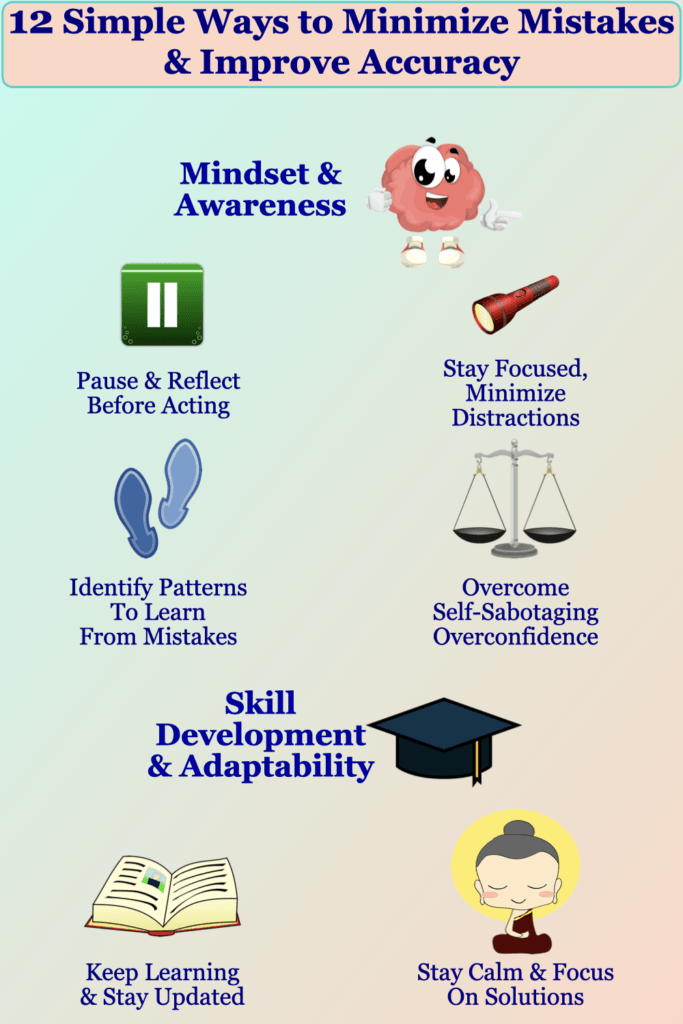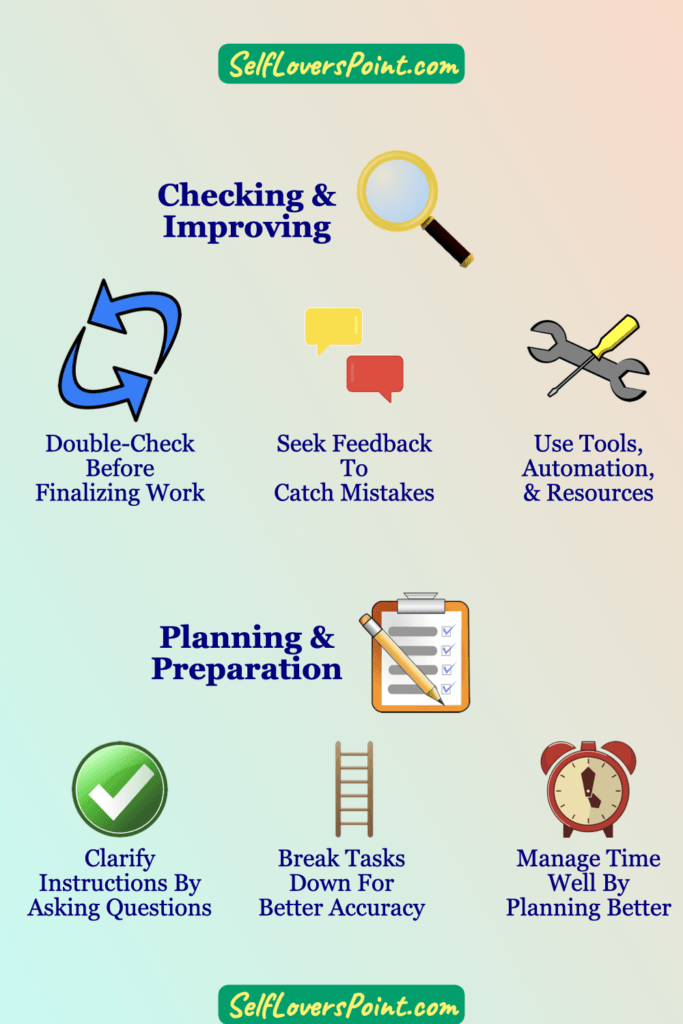Disclaimer: The information provided in this article about guilt and feeling bad about oneself is for informational purposes only and is not intended to replace professional medical advice, diagnosis, or treatment. Always seek the advice of a qualified health provider with any questions you may have regarding a medical condition. If you are in crisis or need immediate help, please contact a mental health professional or call emergency services.
Updated On: February 8, 2025
Mistakes Create Guilt Within Us
Are you trying to find out how to stop feeling guilty about a mistake you committed?
It can be a challenging task to accomplish, as it requires mental effort.
But the good news is that there is a way out of all the guilt and shame.
Mistakes are part and parcel of our lives.
No matter how hard we try, mistakes happen.
Why?
Mistakes happen for various psychological and practical reasons, and not because you want to commit them.
Here are the main reasons why one may commit mistakes.


Whatever the reason, our mistakes either harm us or cause damage to others.
Either way, mistakes make us feel bad about ourselves.
The most common feeling generated by mistakes is guilt.
We cannot bear that we did something wrong that made somebody’s life worse.
And this guilt stays and keeps growing within us to hamper our emotional and psychological well-being.
We cannot allow this.
Therefore, finding ways to overcome feelings of guilt after committing a mistake is essential.
Let’s find out simple steps to stop thinking about and feeling guilty about your mistakes.
How To Stop Feeling Guilty About A Mistake

You can use five steps to overcome the guilt associated with mistakes.
Realize That The Mistake Is In The Past Now
The first way to stop feeling guilty after a mistake is to realize that it is in the past now.
When you commit a mistake, it’s not a good feeling that you have to go through.
But you have to realize that it’s all in the past now.
Feeling bad or guilty about the mistake cannot help you revisit that moment or reverse what has already happened.
So, thinking about it constantly is not going to help.
On the contrary, it will make life harder and make you commit even more mistakes.
So, you’ll have to let the past go, regardless of how tough or troublesome it may have been.
When you realize you cannot change the past, you will allow yourself to stay in the present and look for a possible solution.
If Possible, Find A Way To Reverse The Damage

The next step to stop feeling guilty about a mistake is to find a way to reverse the damage done, as far as possible.
There are very few grave mistakes that one cannot reverse.
But the good news is that most of your mistakes are reversible, or at least compensable.
So, if you damage or break a possession, such as a phone, you can replace it with a new one.
Yes, you may need to work harder and earn more to achieve that.
However, in the end, it will be a win-win situation for you as you will reverse the damage done and also learn to work harder and smarter.
Your enhanced capability will also help you earn more in the future.
If you are inclined towards learning and improving, reversible mistakes might not make you feel guilty.
Apologise For Your Mistake
The next step in overcoming feelings of guilt about a mistake is to apologize.
There are mistakes that money cannot reverse.
For example, when you hurt somebody’s feelings by lying or saying hurtful things.
To rectify your mistake of hurting someone, you need to gather the courage and apologize to them to make them feel better.
Let them know that you did not mean to hurt their feelings and that you will be more careful about it in the future.
Ask them if there’s anything you can do to make them feel better, and give them whatever they request.
Doing so makes them believe that you are sorry for your behavior.
It will also give you the feeling that you have reversed the damage, thus freeing you of the associated guilt.
Learn And Improve From Your Mistake

The next step to overcome feelings of guilt about a mistake is to learn from it and make improvements.
Reversing and apologizing help overcome the guilt of committing a mistake.
However, the most effective and sustainable way to deal with the guilt of committing a mistake is to become a better person.
To learn from your mistakes and improve going forward, you must not forget your mistakes.
You must also remember what damage the mistake caused and how it made you feel, not to make you feel bad, but to avoid repeating it.
Reversing the damage and apologizing, which you have already done, would also help in ensuring that you no longer feel bad for your mistake.
When you feel you have truly learned from the mistake, it will help immensely in overcoming the underlying guilt.
Become More Responsible
The final step in overcoming feelings of guilt about a mistake is to take responsibility without fear.
We feel guilty about making a mistake only because we feel irresponsible.
But when we start taking responsibility, guilt vanishes from our lives forever.
Even if you make a mistake, you do not feel very guilty because you know it’s a genuine or honest mistake.
So you can forgive yourself.
If you are confident about yourself, you can also convince others, which will further prevent guilt from rising.
So, see your mistakes as a way to become more responsible.
Don’t Try To Avoid Mistakes, Eliminate The Guilt

To mentally recover from a mistake, you need to remember an important caveat: you need to eliminate the guilt, not the mistake.
Mistakes are natural and normal for a human being, and they only need minimization.
Mistakes within a certain healthy threshold help you learn and become a better version of yourself.
Making a few healthy mistakes ensures that guilt doesn’t creep into your mind.
Here’s how you can minimize mistakes and make guilt more manageable.


So, allow yourself to make mistakes and find ways to eliminate any unnecessary guilt.
It will help you embrace your “Flawed Self,” thus enabling you to live freely.
When you accept yourself as a person, your self-love rises like a shining star in the sky.
FAQs
What is the psychology of guilt?
The psychology behind guilt can be attributed to either low self-confidence or a perfectionist habit. When you do not trust yourself enough, you feel you are doing everything wrong, which generates guilt. Also, if you have perfectionist tendencies, you feel guilty whenever your work falls short of your expectations.
Is it normal to feel bad all the time?
No, it’s not normal and mentally very unhealthy to feel bad all the time. ‘Normal’ is feeling positive and at peace within yourself. It’s okay to feel bad sometimes for a mistake, so that you can work on yourself and improve. But feeling bad all the time means you are putting unnecessary pressure on yourself.
How do you stop feeling guilt and regret?
To stop feeling guilt and regret, work on eliminating the reasons for them. Take the guilt positively and turn it into an opportunity. So, if you feel guilty for being lazy yesterday, be extra active and productive today. Also, to stop feeling guilt and regret for the past, learn to forgive yourself, and trust your instincts.
Why do I feel so guilty for my mistakes?
Feeling guilty for mistakes is natural, and it’s what makes us human. It also demonstrates that you are a responsible individual who understands your obligations. Guilt can be a strength; do not allow it to become your weakness. Maintain a healthy limit by giving yourself the benefit of the doubt and using guilt as a motivator for improvement.
How do you stop feeling like a bad person?
Filling yourself with goodness is the best way to stop feeling bad after committing a mistake. Do things you perceive as right or good to feel good again. Generally, apologizing for your mistake with a clean heart washes away all guilt and regret. Next, make an effort to rebuild what you have damaged.
What is toxic guilt?
Toxic guilt is the guilt that makes you negative, making you do more bad things to overcome the initial guilt. But it’s a trap that leads you to become a bad person. Therefore, it’s essential not to be intimidated by guilt and work to bring it under your control. Remember, two wrongs do not make a right.
How do guilty people act?
There are two unhealthy ways people react to guilt. First, they never forgive themselves for their mistakes and start taking half-hearted steps in life. Second, in an attempt to somehow overcome their guilt, they voluntarily start doing wrong things and, in the process, become bad people. Both of these ways ruin lives.
Why do I cry when I mess up?
You cry after making a mistake because the shock and guilt of making the error become overwhelming for you. But crying is a relatively better way to deal with guilt, as you release it simultaneously. If you feel guilty after crying, forgive yourself, apologize for your mistake, and work towards reversing the damage done.
How long does guilt last?
If you don’t repeatedly remind yourself of your mistake, time will quickly wash away the guilt. But if you don’t forget the error, your guilt might live within you. Thus, you must find a way to forgive yourself for your mistake. It will help you instantly wash away any guilt.
How do I stop feeling guilty immediately?
You can stop feeling guilty immediately after a mistake in two possible ways. First, do not view it as a mistake, but rather as something human. Stop judging yourself too much by finding humor in the situation. Start flowing like a river. Second, when you make a mistake, apologize immediately and remind yourself to correct it.
How do you correct your mistakes in life?
If you look at it closely, life is a series of mistakes that help you make something significant, provided you learn from your mistakes. You cannot carry the guilt of your mistakes forever or go after correcting each error. The only thing you can do is continue to improve going forward.
How do you stop feeling guilty without confessing?
To stop feeling guilty without apologizing for your mistake, you need to mentally strengthen yourself. You should be able to forgive yourself easily, and only your opinion should matter to you. However, a caveat to this is that you should not become irresponsible. The art of forgiving yourself is a power that also comes with a corresponding sense of realisation and responsibility.
Does guilt ever go away?
Yes. You can learn to eliminate guilt by forgiving yourself, confessing to your mistake, and making the necessary corrections. Additionally, time is a valuable resource that helps wash away guilt as you forget your mistakes and improve. The only thing you need to do is not to hold onto your mistakes tightly. Open your mind and let them go.
How do I forgive my mistakes?
Enlighten your mind with the truth that nobody is perfect. As long as you accept your mistakes, apologize for them, and are willing to make an effort to correct them, you are okay. There is no need to carry any guilt or regret within yourself. See yourself as a child and forgive them like any other child.
How do I forget embarrassing mistakes?
We see our mistakes as embarrassments because we have a big ego. Let go of all your made-up notions about yourself. When you do this, you will see the lighter side of your mistakes and they will no longer seem embarrassing. If you can’t do this, consider yourself to be in a learning phase, as it will prevent you from feeling embarrassed about your mistakes.
How do I accept my mistakes?
One needs to be brave to accept their mistakes. People often refuse to accept their mistakes to avoid guilt and embarrassment, but this ultimately harms them deeply. Be courageous, admit your mistakes, and use the guilt to correct them. This will launch you on a continuous path of self-improvement, and your mistakes will get minimized.
Why do I feel guilty about enjoying life?
When you enjoy yourself, you feel like you’re giving up an opportunity to work and earn more money. Some people feel guilty even for experiencing a moment of happiness because they think they are avoiding work stress, which will make them “poorer.” You need to set the work-life balance right and give up enjoyment-guilt.
How to do nothing and not feel guilty?
Do a lot of work before going into that mode. I have a friend who plans to work until he is 35 and then retire. He wants to earn a lot of money by the time he is 35 and then relax and enjoy the rest of his life. If you are already that rich, you can afford to do nothing and not feel guilty.
How do I stop judging myself for mistakes?
Give yourself the benefit of the doubt. Tell yourself that you are not perfect or do not have all the knowledge in the world. It’s also possible that it’s not a mistake but a blessing in disguise. Another way is to stop judging others for their mistakes, as it also subconsciously trains you to judge yourself.
Why do I overthink every mistake I make?
Overthinking a mistake may be due to the habit of perfectionism. It can also be due to low self-esteem, where you constantly second-guess yourself. Also, if you were not encouraged enough as a child but were blamed for being careless, you might have developed the tendency to overthink every action of yours.
Does God forgive all sins?
Yes. God is full of forgiveness, even for our gravest mistakes. He doesn’t judge us harshly and always gives us a second chance. He always allows us to learn from our mistakes and correct them. It just takes this realization to start seeing our mistakes as a natural and normal part of our lives.
Is it okay to be lazy on the weekend?
Yes. After working hard all week, you deserve all the rest you need. It’s necessary to rejuvenate you and prepare you for the next week. If you feel guilty for resting on weekends, your health or your work might suffer, which will hurt you. So, for a healthy work-life balance, weekend rest is essential.
How do you stop productivity guilt?
Productivity guilt is when you feel guilty for your low productivity at work. It can be overcome by being satisfied with the quality of your work rather than the quantity. It’s okay if you do not produce a lot of work quickly. Focus on creating great work without caring about time. When quality comes, quantity will follow.
How do you stop feeling guilty about wasting time?
The guilt of wasting time can be overcome in two distinct ways. First, be determined not to waste time in the future. Additionally, strive to raise the quality of your work to compensate for the lost time. Second, do not consider planning or resting a waste of time. See it as an investment in your work, something that is necessary.
How do you stop feeling guilty for resting?
If you feel guilty about resting, you must understand that it’s not a luxury but a necessity. To make it easier, look at rest as an organic part of your work, which refreshes you to do more and better work. When you start seeing the value in rest, you will stop feeling guilty about resting.
Is guilt a mental illness?
No. Guilt is a natural emotion that humans experience. Its purpose is to help you stay responsible and focus on constant self-improvement. However, if you take guilt negatively or let it increase to a very high level, it may become a mental weakness. It may also land you in chronic depression. Thus, you need to learn active guilt management.
What is a famous quote about guilt?
Theodore Roosevelt gave a witty and humorous quote about guilt: “If you could kick the person in the pants responsible for most of your trouble, you wouldn’t sit for a month.” He wanted to say that our guilt and tendency to blame ourselves result from our actions and inactions.
How do I overcome the guilt of mistakes?
When you accept your mistake, please don’t be pinned down by guilt. Forgive yourself for the error, letting yourself know that you are not perfect and that it’s okay to make mistakes. Then, genuinely apologize for your mistake. Finally, correct the damage to whatever extent possible. Make it a point to improve going forward.




